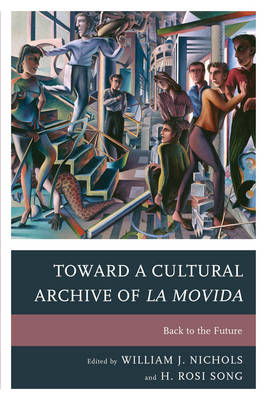
Toward a Cultural Archive of la Movida
Fairleigh Dickinson University Press (Verlag)
978-1-61147-630-9 (ISBN)
The perception of Spain as representative of a successful dual transition from dictatorship to democracy and free market capitalism created a “Spanish model” that has been emulated in countries like Portugal, Argentina, Chile and Hungary, all formerly ruled by totalitarian regimes. While social scientists study the promises, contradictions and failures of the Spanish Transición—especially on issues of memory, repression, and (the lack of) reconciliation —our approach from the humanities offers another vantage point to a wider discussion of an unfinished chapter in recent Spanish history by focusing on la Movida as the “cultural archive” whose cultural transitions parallel the political and economic ones. The transgressive, urban nature of this movement demonstrated an overt desire, especially among Spanish youth, to reach onto a global arena emulating the punk and new wave aesthetic of such cities as London, New York, Paris, and Berlin. Art, design, film, music, fashion during this period helped to forge a sense of a modern urban identity in Spain that also reflected the tensions between modernity and tradition, global forces and local values, international mass media technology and regional customs.
William J. Nichols is associate professor of Spanish at Georgia State University. H. Rosie Song is associate professor of Spanish at Bryn Mawr College.
TABLE OF CONTENTS
TABLE OF ILLUSTRATIONS
INTRODUCTION
1) Back to the Future: Towards a Cultural Archive of la Movida (William Nichols & H. Rosi Song)
I. THEORIZING LA MOVIDA
2) “La Movida as Debate” (Jordi Marí)
3) “From the Unrest to la Movida. Cultural Politics and Pop Music in the Spanish Transition” (Héctor Fouce)
4) “The Same in Name, but Different: la Movida madrileña and the other ‘Movidas’ of Spain” (Hamilton Stapell)
5) “In/Authenticities: Movida Youth Culture in Motion” (Christine Henseler)
II. PERIPHERAL MOVIDAS AND MEDIA REVOLUTIONS
6) “The Dark Heart of la Movida: Vampire Fantasies in Iván Zulueta’s Arrebato” (Alberto Mira)
7) “Peripheral Movidas: Cannibalizing Galicia” (José Colmeiro)
8) “Queer Traces in the Soundtrack of la Movida” (Jorge Pérez)
9) “Party to the People: Heroin and the Spanish ‘Lost’ Generation” (Francisco Fernández de Alba)
III. TAKING BACK THE CITY: POLITICS OF SPACE AND PLACE IN SPAIN
10) “Urbanism, Architecture, and la Movida madrileña” (Susan Larson)
11) “Sketching the Future Furiously: La Movida, Graphic Design and the Urban Process in Madrid” (Malcom Compitello)
12) “Liberty Street, the Liberty of the Street: La Movida and Political Transition” (Juan Pablo Wert Ortega)
13) “From Carajillo to Madriz: The comics of la Movida” (Pedro Pérez del Solar)
IV. STILL IN THE PRESENT: GHOSTS OF LA MOVIDA
14) “From Counter-Culture to National Heritage: ‘La Movida’ in the Museum and the Institutionalization of Irreverence” (William Nichols)
15) “Memory and Archive: la Movida, Alaska and Processes of Cultural Archeology” (Silvia Bermúdez)
16) “Ghostly Subjectivities: Photography, Spectral Identities, and the Temporality of la Movida” (Jonathan Snyder)
17) “The Metamorphosis of Memory and la Movida in Recent Documentary Films” (Marcela T. Garcés)
NOTES ON CONTRIBUTORS
INDEX
| Co-Autor | Francisco Fernández de Alba, Silvia Bermúdez, José Colmeiro, Malcom Alan Compitello, Héctor Fouce |
|---|---|
| Verlagsort | Cranbury |
| Sprache | englisch |
| Maße | 160 x 235 mm |
| Gewicht | 717 g |
| Themenwelt | Geschichte ► Allgemeine Geschichte ► Neuzeit (bis 1918) |
| Geisteswissenschaften ► Geschichte ► Regional- / Ländergeschichte | |
| Geisteswissenschaften ► Sprach- / Literaturwissenschaft ► Anglistik / Amerikanistik | |
| Geisteswissenschaften ► Sprach- / Literaturwissenschaft ► Literaturwissenschaft | |
| ISBN-10 | 1-61147-630-5 / 1611476305 |
| ISBN-13 | 978-1-61147-630-9 / 9781611476309 |
| Zustand | Neuware |
| Haben Sie eine Frage zum Produkt? |
aus dem Bereich


